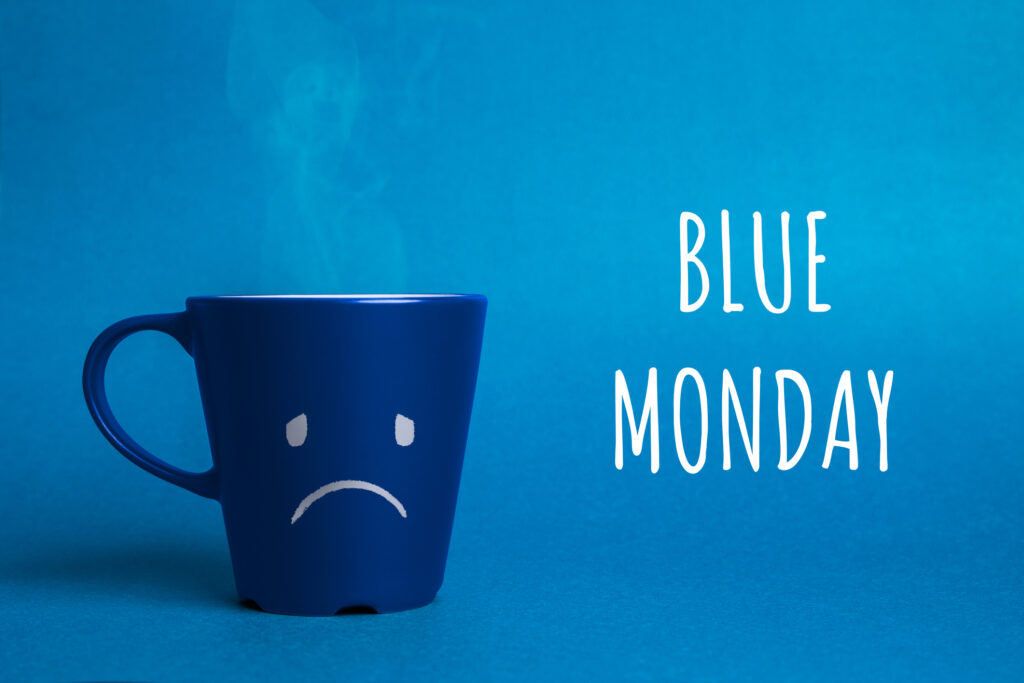The 3rd Monday of January (16th January 2023) after festive celebrations of Christmas and New Year has overtime become known as ‘Blue Monday’ – what is often referred to as the gloomiest or ‘blue’ day of the year.
A mix of post-celebration mood, back to school or work routines, long dark days and for many financial struggles can make January one of the challenging months.
Blue Monday presents a brilliant opportunity to open conversations and discuss our mental wellbeing, and how normal it is to feel blue.
Jo Kent Humber and North Yorkshire Health and Care Partnership’s Suicide Prevention Programme Lead shares how she gets back into her routine and ways to help support her wellbeing during challenging months like January: “I am no exception when it comes to feeling the January blues! So here is what I do…
” I make my to do list for those jobs I have been putting off and focus on completing them, there is nothing like ticking off a job. I plan my exercise routine, thinking of the summer months that are on their way, so I hit the regime hard, with extra walks or sessions(even when I don’t feel like it), I never regret a session.
“I clear the cupboards of junk food and replace with healthy foods, I put the timer on my phone, it is turned off from 10:00pm until 7:00 am and I volunteer at the Emotional Wellbeing hub, its amazing, the benefits you get from helping others. Lastly I make time to call the people I love.”
Many of us may be suffering with low motivation but we have our top tips to combat those January blues and to kick-start your new year wellbeing:
- Talk
- Reach out to someone this Blue Monday, either a friend, family member or colleague whether that be via video or phone call. Or why not meet up for a cuppa and chat and take part in Samaritans ‘Brew Monday’ instead. “A problem shared is a problem halved.”
- Exercise, rest & eat well
- Stepping outside for a stretch or short walk can help to instantly refresh your mind and boost your mood. Take time whether that be in the morning, mid-day or after work to reset. Eat regular and healthy meals to ensure your body is well fuelled and try to get enough sleep to allow you to feel awake, motivated and well rested for the next day ahead.
- Self-care
- Take time for yourself and do something you enjoy or that you find calming; a walk, read a book, go to your favourite place, a bath or watching a film. Do something for you. Making yourself a priority and taking care of your wellbeing can help boost your mood and focus. Even just once a week #self-caresundays.
- Volunteering
- This is a great way of building your community, giving something back, learning new skills, making friends, it is good for you CV, your mental health and you may make a real difference to someone else’s life
- Managing stress & time
- Maybe you’ve just gone back to work and restarted your hectic daily routine. Make time to manage and prioritise your tasks to ensure you don’t overwhelm yourself. Set small achievable goals, a small to-do list or split your day into groups of time. At the end of the week write 3 things you have achieved or feel positive about.
- Share & learn
- Speaking out and sharing your story or worries could help someone else. You can also join the #Talk suicide training It is free and take’s around 20 minutes, take action to expand your knowledge surrounding mental health www.talksuicide.co.uk
There are also many useful tools to help you manage your health and wellbeing too, such as:
- NHS Every Mind Matters
- Humber and North Yorkshire Staff Resilience Hub
- #Talk Suicide
- Charities such as: Samaritans, MIND and Rethink
- Apps such as: Qwell, Headspace and Unmind
If you need urgent help, or if you’re worried about someone you know, help is available from the services below:
- Samaritans: 116 123
- C.A.L.M (for men, 5pm-12am): 0800 585 858
- Papyrus: 0800 068 4242
- NHS Urgent Mental Health Helpline

